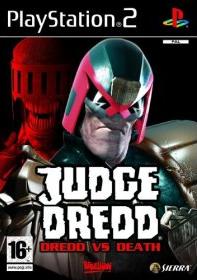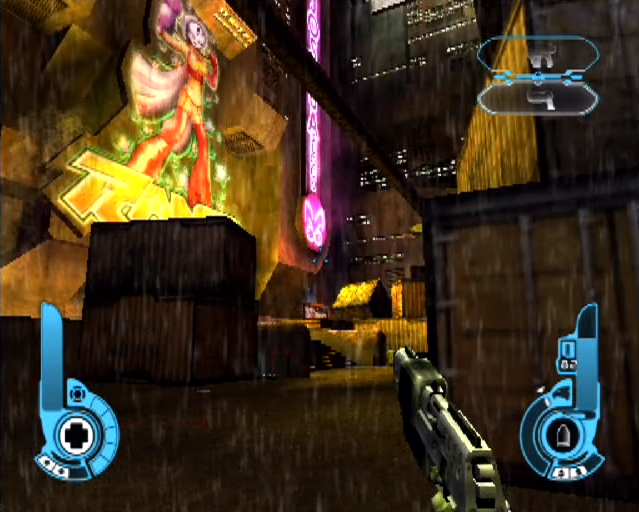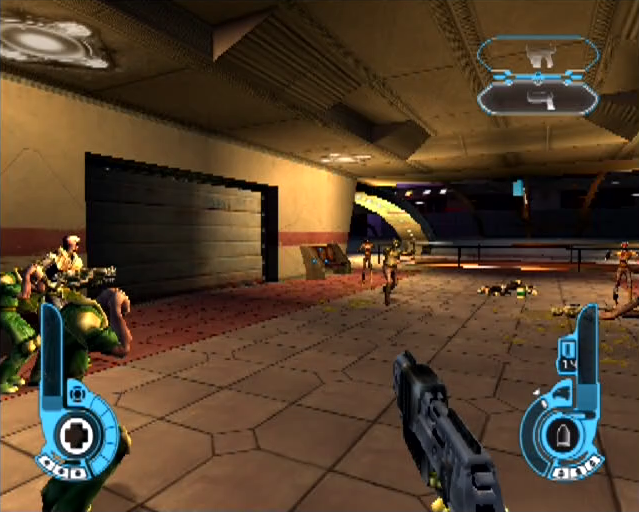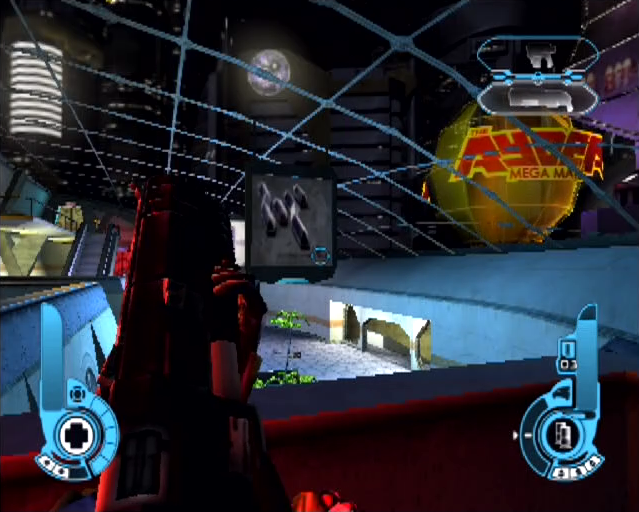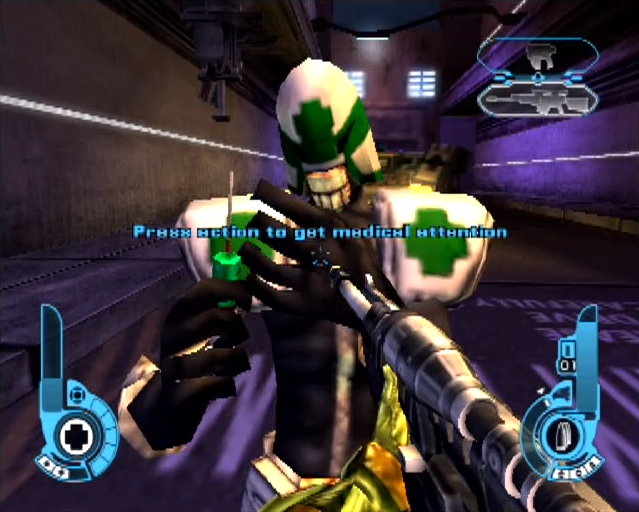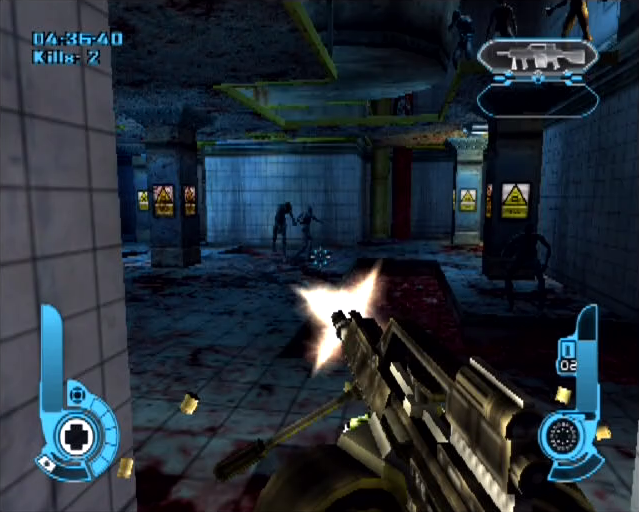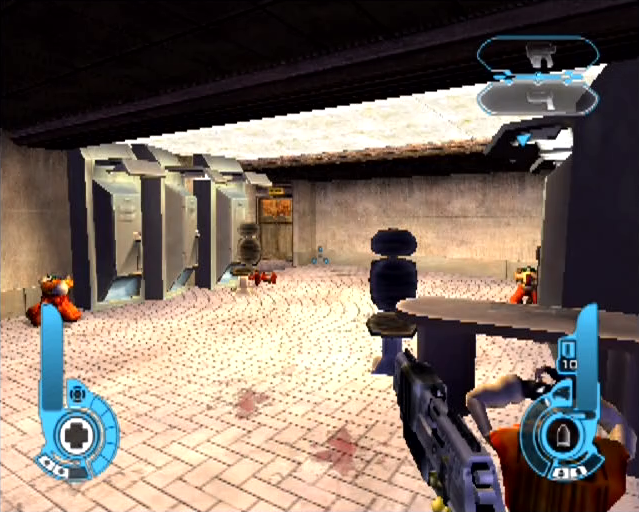JUDGE DREDD: DREDD VS. DEATH (PS2)
In hindsight, a better game engine and a little more polish might have seen Judge Dredd: Dredd vs. Death elevated to a level of excellence. Atmospheric setting? Check. Varied missions and interesting level design? Check. A handful of neat bosses and a raft of graphic novel sound bites and references? You betcha. Sadly, a dated game engine would mean Rebellion were unable to extract the most from this promising license. It has a similar feel to many sixth-generation console shooters, still dreaming of emulating Half-Life’s elusive, semi-expansive FPS-with-adventuring trope, years later. In 2003, Dredd vs. Death would have to be content with a good-not-great label.
Trouble’s afoot in Mega-City One. Prodigiously-chinned law enforcer Judge Dredd not only must deal with an abundance of street crime and ever-intensifying gang wars, but the ethereal forms of Judges Death, Fire, Fear and Mortis having escaped incarceration and taken physical form. With Judge Death gathering the support of cultists and a raft of undead creatures sweeping the city, the race is on to subdue and recapture the quartet before they wreak havoc.
The city is a highlight, showcasing some evocative and ecentric locations, with a range of mission objectives
The dangerous, futuristic cityscape is a fun place to explore and never short on personality. There’s a nice line in dark witticisms, with the larger city-goers trundling around on wheels with t-shirts emblazoned with ‘eat me’, as well as hints as to a less-than-appetising futuristic cuisine consisting of such delicacies as Munce pies and Grot pots. As well as encountering the occasional peacekeeper or member of the public, each level consists of a sizeable chunk of city to explore, typically accompanied by a range of secondary objectives. These integrate nicely around the main missions and generally involve arresting gang members, or shepherding civilians out of dangerous areas. Dredd can mow down perps with his adaptive-fire pistol, or (much more fun) scream threatening slogans at them to bring about surrender and an arrest. How about random bystanders? You can arrest them as well, with Dredd trumping up amusing charges relating to noise annoyance and owning a hamster without a licence. No wonder the populace moans about being oppressed.
More arrests result in a better score and rank at the end of the level. This in turn unlocks more characters and levels in the Arcade and Battle (multiplayer) modes. Neither of these quite set the world alight, but Arcade does deliver some solid, uncomplicated variations on familiar quick-fire shoot ‘em up modes, with survival, block wars and hostage escorts adding legitimate lifespan to the package. Battle is less impressive, with dull, protracted deathmatch encounters that fail to trouble the better PS2 FPS multiplayer suites. Of greater merit is the inclusion of a two-player split-screen campaign, where you and a friend can play through the main story with very little in the way of detail omitted. This offers a means of bypassing some of the single-player’s spikier moments of difficulty, as you or your partner will keep respawning provided you don’t die simultaneously. It’s not on the same level as TimeSplitters 2, but remained a very welcome inclusion during a time when console FPSs simply didn’t provide for couch co-op experiences.
More arrests result in a better score and rank at the end of the level. This in turn unlocks more characters and levels in the Arcade and Battle (multiplayer) modes. Neither of these quite set the world alight, but Arcade does deliver some solid, uncomplicated variations on familiar quick-fire shoot ‘em up modes, with survival, block wars and hostage escorts adding legitimate lifespan to the package. Battle is less impressive, with dull, protracted deathmatch encounters that fail to trouble the better PS2 FPS multiplayer suites. Of greater merit is the inclusion of a two-player split-screen campaign, where you and a friend can play through the main story with very little in the way of detail omitted. This offers a means of bypassing some of the single-player’s spikier moments of difficulty, as you or your partner will keep respawning provided you don’t die simultaneously. It’s not on the same level as TimeSplitters 2, but remained a very welcome inclusion during a time when console FPSs simply didn’t provide for couch co-op experiences.
It’s hard to shake the feeling however that the game engine holds it back. Mega-One City is a great setting, with no shortage of neat details and a distinctive appearance, but there’s no getting around the fact it feels dated. Most of the backgrounds look a little low-resolution, with gangly and lacklustre character models and the occasional bout of slow-down in more open environments. Similarly, the shooting feels adequate but slightly imprecise and unexciting, something that is exacerbated by faster enemies who can be a real irritation.
A.I. can seem rickety too. Whilst it’s nice to enlist help from street judges, who help add much-needed spectacle to firefights they, along with some of the civilians who need rescuing, are susceptible to anything stronger than a gust of wind. This is particularly vexing when you’re trying to escort a train of characters, only to be set upon by vampires spawning seemingly out of nowhere. The odd civilian protection task has triggered a fail before I’d even reached them.
A.I. can seem rickety too. Whilst it’s nice to enlist help from street judges, who help add much-needed spectacle to firefights they, along with some of the civilians who need rescuing, are susceptible to anything stronger than a gust of wind. This is particularly vexing when you’re trying to escort a train of characters, only to be set upon by vampires spawning seemingly out of nowhere. The odd civilian protection task has triggered a fail before I’d even reached them.
Whilst its gameplay is unspectacular, the levels themselves are decent. The Mega Mall is a particular highlight as Dredd navigates a “consumerist hell-hole”, saving shoppers from vampires and zombies. The four bosses are novel too: Judge Mortis spouts deadly viral trails and requires neutralising with the help of sleeping gas. Judge Fire is the pick of the bunch, a (literally) flaming lunatic whom you fight in the multi-floored Smokatorium, a trendy smoker’s bar. Liberal usage of the sprinkler system is required to subdue this enigmatic antagonist. The twelve-mission campaign is a strong one on the whole, as though the last couple of levels are a little limp, there’s plenty to enjoy in the meantime.
Judge Dredd: Dredd vs. Death makes up for a mediocre game engine with an engaging setting in Mega-City One and good level design. When combined with a diverse range of mission objectives and a surprisingly effective storyline with great antagonists, it has a fair bit going for it. Fans of the graphic novels will get the most mileage from this one, though FPS fans may be disappointed by its unremarkable combat and modest technical capabilities. There are better shooters out there and the wait for a definitive Dredd game would continue, but all things considered, it’s one of his better outings.
Judge Dredd: Dredd vs. Death makes up for a mediocre game engine with an engaging setting in Mega-City One and good level design. When combined with a diverse range of mission objectives and a surprisingly effective storyline with great antagonists, it has a fair bit going for it. Fans of the graphic novels will get the most mileage from this one, though FPS fans may be disappointed by its unremarkable combat and modest technical capabilities. There are better shooters out there and the wait for a definitive Dredd game would continue, but all things considered, it’s one of his better outings.
|
|
VERDICT
"Dredd vs. Death makes up for a mediocre game engine with an engaging setting and good level design. There are better FPSs out there, but all things considered, it’s one of Dredd's better video game outings." OVERALL: 6/10 |
